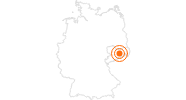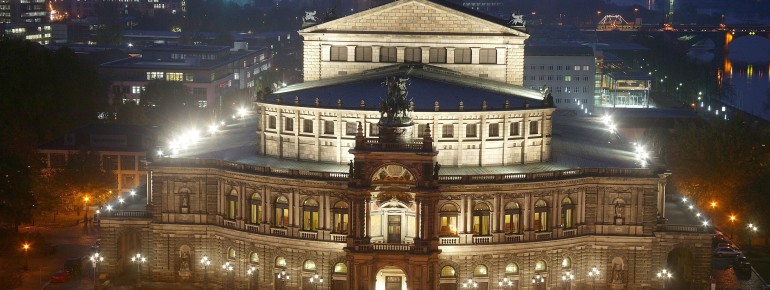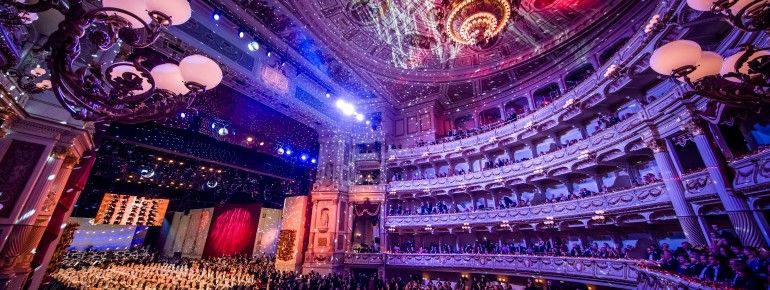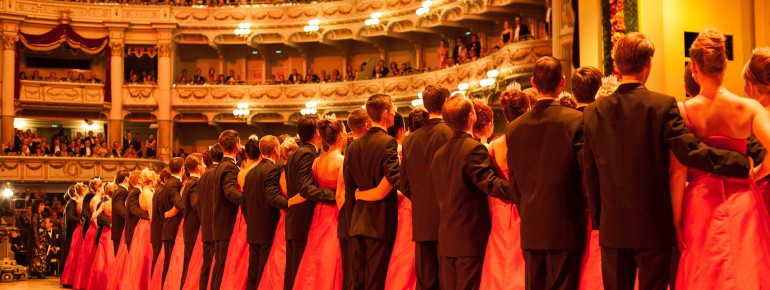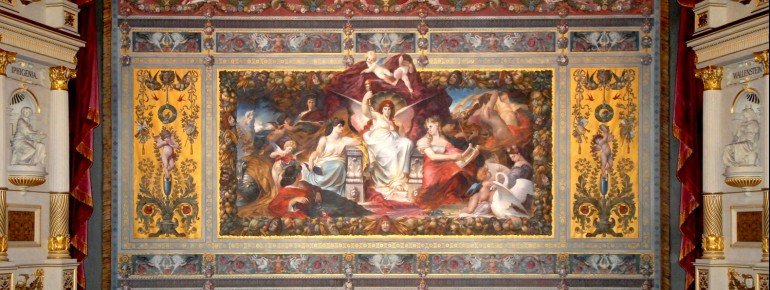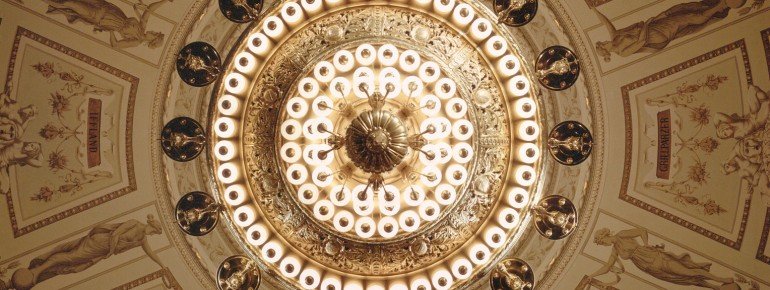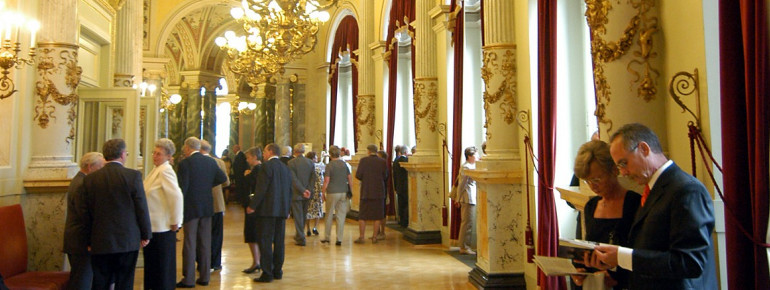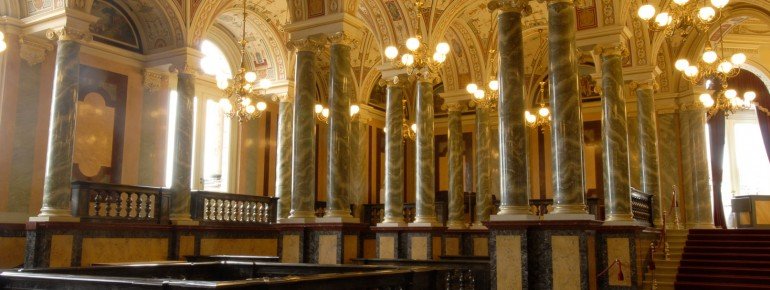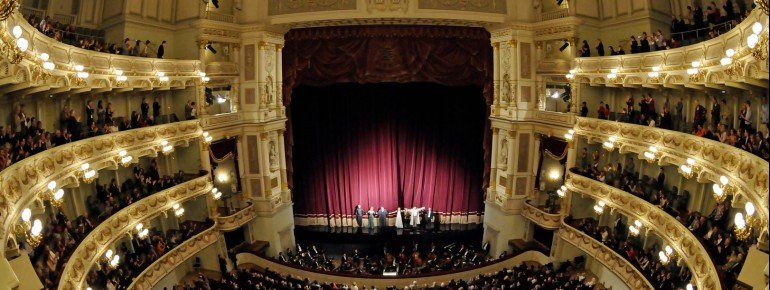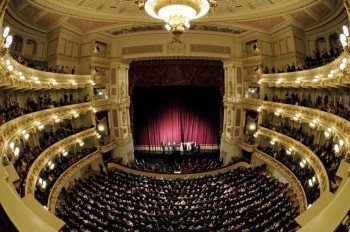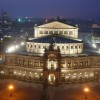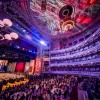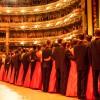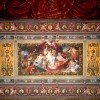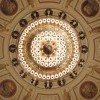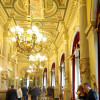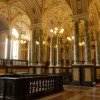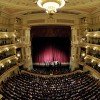Contents
Description
The Semper Opera House is located on Theaterplatz and in the historic core of Dresden, the capital of Saxony, and is the venue for concerts by the Saxon State Orchestra. The name is derived from its architect Gottfried Semper.
Exterior view
Above the opera's main entrance is a bronze panther quadriga with statues of Dionysus and Ariadne by sculptor Johannes Schilling. The two figures of Johann Wolfgang von Goethe and Friedrich Schiller decorate the large entrance area.
William Shakespeare, Sophocles, Molière and Euripides adorn the side view of the facade as statues. On the west side of the backstage there are Saxon coats of arms, a bust of Gottfried Semper and the figures "Love" and "Justice".
Interior view
The opera house seats approximately 1,300 visitors. These are distributed over four tiers and the stalls, which can be enlarged or extended to adapt the size of the orchestra pit to the performances. The main stage has a total area of 630 square meters, where the various performances take place. Together with the backstage and the two side stages, the total stage area is more than 1,640 square meters.
Decorative curtain
One of the most imposing elements of the Semper Opera House is the 17-meter wide and 15-meter high decorative curtain weighing 400 kilograms. It is hand-sewn Belgian linen painted with paint mixed according to ancient techniques. It was created by the history painter Ferdinand Keller. It was recreated during the reconstruction after the Second World War.
Guided tours
The Semper Opera House offers varied guided tours for all ages and in a variety of languages. The "Highlight tour" offers a general exploration of the impressive spaces, including the auditorium and foyer. "Architectural tours" focus on the building's architectural history and stylistic features, while the "Scandals at the Semper Opera" tour allows guests to look behind the scenes, learn about mishaps during performances, and hear stories surrounding the stars and divas of the opera world. In addition, various guided tours are offered for children, in which, for example, the professions at the Semper Opera are explained. Occasionally, theme-specific tours are also offered on aspects such as opera history or artists' perspectives. These are just a few of the bookable tours that are offered.
Historical Information
Due to catastrophic fires, bombing raids, and floods, the Dresden Semperoper had to be restored several times over the years. As a result, its history can be divided into three construction phases.
First Construction Phase:
From 1838 to 1842, the architect Gottfried Semper built a new royal court theater at the request of King Friedrich August II. The resulting circular building was designed in the Italian early Renaissance style and was considered one of the most beautiful theaters in Europe. The digital clock by watchmaker Gutkaes, located above the stage, attracted particular attention. However, a fire completely destroyed the building on September 21, 1869.
Second Construction Phase:
After the devastating fire, the opera house had to be rebuilt quickly. However, the architect Gottfried Semper had participated in the Dresden May Uprising of 1849, which led to him being banned from setting foot on Saxon soil for a long time. From afar, he designed a second opera house, which was built under the direction of his son Manfred. Between 1871 and 1878, Manfred Semper created an opera house with magnificent interior decorations, ceiling, and frescoes by James Marshall, and a clock inspired by Gutkaes' original design.
During the air raid on Dresden on February 13, 1945, the Dresden Semperoper was heavily damaged.
Third Construction Phase:
A few days after the attack, the extent of the damage became visible: the audience and stage areas were completely destroyed, and the back wall of the stage house collapsed. Only the promenades remained intact.
The cornerstone for reconstruction was laid in June 1977. Under the supervision of architect Wolfgang Hänsch, the opera house was rebuilt based on Semper's original plans. During this process, the audience area was enlarged by moving the walls of the stage area outward. On February 13, 1985, exactly 40 years after the wartime attack, the opera house was reopened. As was the case when it closed in 1944, the opera "Der Freischütz" by Carl Maria von Weber was performed at the reopening in 1985. Since reunification, the building has been officially called the "Saxon State Opera."
The devastating Elbe River flood in August 2002 caused severe damage to the Semperoper once again. The total cost of repairs amounted to more than 27 million euros. Just three months after the flood, the opera reopened in November 2002. The dancers of the Semperoper Ballet opened the new season with "Illusions - Swan Lake."
Since 2006, the annual Dresden Opera Ball has been held again. The tradition from the years 1925 to 1939 was revived on the occasion of the city's 800th anniversary celebrations.
Interesting facts
- Semperoper Dresden is the the best rated tourist attraction in Saxony.
How to get there
By Car:
Dresden is connected to the German road network via the A4 from the west and east , as well as the A13. If coming from Prague, you can reach the Saxon capital via the A17.
If you want to drive to the city by car, it is best to park directly in the opera house's parking lot or in surrounding parking garages. An alternative to the city center is to use Park and Ride (P+R) facilities in the Dresden area. From there, regional trains and S-Bahn services run regularly to the city center.
By Public Transport:
Dresden is served by several ICE and regional trains daily. From the main train station, take S-Bahn Line 9 to Theaterplatz. If you arrive at Dresden-Neustadt station, take S-Bahn Line 11 to the "Postplatz" stop. From there, it's just a few minutes' walk to the Semperoper.
